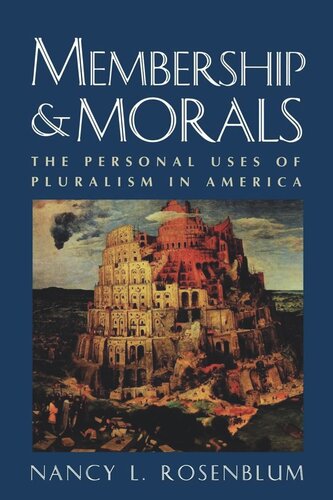

Most ebook files are in PDF format, so you can easily read them using various software such as Foxit Reader or directly on the Google Chrome browser.
Some ebook files are released by publishers in other formats such as .awz, .mobi, .epub, .fb2, etc. You may need to install specific software to read these formats on mobile/PC, such as Calibre.
Please read the tutorial at this link: https://ebookbell.com/faq
We offer FREE conversion to the popular formats you request; however, this may take some time. Therefore, right after payment, please email us, and we will try to provide the service as quickly as possible.
For some exceptional file formats or broken links (if any), please refrain from opening any disputes. Instead, email us first, and we will try to assist within a maximum of 6 hours.
EbookBell Team

4.3
78 reviewsIn recent years, membership has dropped in traditional voluntary associations such as Rotary Clubs, Jaycees, and bowling leagues. At the same time, concern is rising about the growth of paramilitary and hate groups. Scholars have warned that these trends are undermining civic society by creating a dangerous number of isolated, mistrustful individuals and organized, antisocial renegades. In this provocative book, however, Nancy Rosenblum takes a new, less narrowly political approach to the study of groups. And she reaches more optimistic conclusions about the state of civil society.
Rosenblum argues that we should judge associations not only by what they do for civic virtue, but also by what they do for individual members. She shows that groups of all kinds--among them religious groups, corporations, homeowner associations, secret societies, racial and cultural identity groups, prayer groups, and even paramilitary groups--fill deep psychological and moral needs. And she contends that the failure to recognize this has contributed to an alarmist view of their social impact. For example, she argues that, although extremist groups have obvious antisocial aims, they constrain individuals who would be even more dangerous as maladjusted loners. And she examines the rapid growth of small "support groups"--which are usually dismissed as politically irrelevant--and shows that the moral support people find in such places as prayer groups and self-help groups helps to cultivate the social trust some scholars say is disappearing. Rosenblum concludes that, for practical and principled reasons, American democracy should permit expansive freedom of association, illustrating her case with discussion of specific cases in law.
Rosenblum recognizes, however, that freedom has a price. She reminds us that some groups have oppressive and even criminal tendencies, and she explores what liberal democracy should do to ensure that individuals also have freedom within associations and freedom to exit. Throughout, Rosenblum writes eloquently and with a powerful moral voice, drawing on law, practical politics, and psychology to produce an original political theory of the moral uses of pluralism. The book adds remarkable depth and subtlety to one of the leading subjects in contemporary social and political debate.